Tan Guo
Generative Adversarial Learning for Trusted and Secure Clustering in Industrial Wireless Sensor Networks
Oct 14, 2022

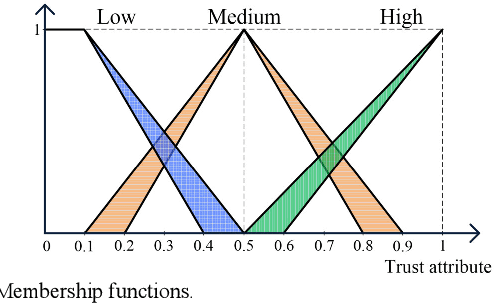

Abstract:Traditional machine learning techniques have been widely used to establish the trust management systems. However, the scale of training dataset can significantly affect the security performances of the systems, while it is a great challenge to detect malicious nodes due to the absence of labeled data regarding novel attacks. To address this issue, this paper presents a generative adversarial network (GAN) based trust management mechanism for Industrial Wireless Sensor Networks (IWSNs). First, type-2 fuzzy logic is adopted to evaluate the reputation of sensor nodes while alleviating the uncertainty problem. Then, trust vectors are collected to train a GAN-based codec structure, which is used for further malicious node detection. Moreover, to avoid normal nodes being isolated from the network permanently due to error detections, a GAN-based trust redemption model is constructed to enhance the resilience of trust management. Based on the latest detection results, a trust model update method is developed to adapt to the dynamic industrial environment. The proposed trust management mechanism is finally applied to secure clustering for reliable and real-time data transmission, and simulation results show that it achieves a high detection rate up to 96%, as well as a low false positive rate below 8%.
Generative Adversarial Learning for Intelligent Trust Management in 6G Wireless Networks
Aug 02, 2022



Abstract:Emerging six generation (6G) is the integration of heterogeneous wireless networks, which can seamlessly support anywhere and anytime networking. But high Quality-of-Trust should be offered by 6G to meet mobile user expectations. Artificial intelligence (AI) is considered as one of the most important components in 6G. Then AI-based trust management is a promising paradigm to provide trusted and reliable services. In this article, a generative adversarial learning-enabled trust management method is presented for 6G wireless networks. Some typical AI-based trust management schemes are first reviewed, and then a potential heterogeneous and intelligent 6G architecture is introduced. Next, the integration of AI and trust management is developed to optimize the intelligence and security. Finally, the presented AI-based trust management method is applied to secure clustering to achieve reliable and real-time communications. Simulation results have demonstrated its excellent performance in guaranteeing network security and service quality.
An Evolutionary Game based Secure Clustering Protocol with Fuzzy Trust Evaluation and Outlier Detection for Wireless Sensor Networks
Jul 21, 2022



Abstract:Trustworthy and reliable data delivery is a challenging task in Wireless Sensor Networks (WSNs) due to unique characteristics and constraints. To acquire secured data delivery and address the conflict between security and energy, in this paper we present an evolutionary game based secure clustering protocol with fuzzy trust evaluation and outlier detection for WSNs. Firstly, a fuzzy trust evaluation method is presented to transform the transmission evidences into trust values while effectively alleviating the trust uncertainty. And then, a K-Means based outlier detection scheme is proposed to further analyze plenty of trust values obtained via fuzzy trust evaluation or trust recommendation. It can discover the commonalities and differences among sensor nodes while improving the accuracy of outlier detection. Finally, we present an evolutionary game based secure clustering protocol to achieve a trade-off between security assurance and energy saving for sensor nodes when electing for the cluster heads. A sensor node which failed to be the cluster head can securely choose its own head by isolating the suspicious nodes. Simulation results verify that our secure clustering protocol can effectively defend the network against the attacks from internal selfish or compromised nodes. Correspondingly, the timely data transfer rate can be improved significantly.
A Secure Clustering Protocol with Fuzzy Trust Evaluation and Outlier Detection for Industrial Wireless Sensor Networks
Jul 20, 2022



Abstract:Security is one of the major concerns in Industrial Wireless Sensor Networks (IWSNs). To assure the security in clustered IWSNs, this paper presents a secure clustering protocol with fuzzy trust evaluation and outlier detection (SCFTO). Firstly, to deal with the transmission uncertainty in an open wireless medium, an interval type-2 fuzzy logic controller is adopted to estimate the trusts. And then a density based outlier detection mechanism is introduced to acquire an adaptive trust threshold used to isolate the malicious nodes from being cluster heads. Finally, a fuzzy based cluster heads election method is proposed to achieve a balance between energy saving and security assurance, so that a normal sensor node with more residual energy or less confidence on other nodes has higher probability to be the cluster head. Extensive experiments verify that our secure clustering protocol can effectively defend the network against attacks from internal malicious or compromised nodes.
An Intelligent Trust Cloud Management Method for Secure Clustering in 5G enabled Internet of Medical Things
Jul 19, 2022



Abstract:5G edge computing enabled Internet of Medical Things (IoMT) is an efficient technology to provide decentralized medical services while Device-to-device (D2D) communication is a promising paradigm for future 5G networks. To assure secure and reliable communication in 5G edge computing and D2D enabled IoMT systems, this paper presents an intelligent trust cloud management method. Firstly, an active training mechanism is proposed to construct the standard trust clouds. Secondly, individual trust clouds of the IoMT devices can be established through fuzzy trust inferring and recommending. Thirdly, a trust classification scheme is proposed to determine whether an IoMT device is malicious. Finally, a trust cloud update mechanism is presented to make the proposed trust management method adaptive and intelligent under an open wireless medium. Simulation results demonstrate that the proposed method can effectively address the trust uncertainty issue and improve the detection accuracy of malicious devices.
An Intelligent Deterministic Scheduling Method for Ultra-Low Latency Communication in Edge Enabled Industrial Internet of Things
Jul 17, 2022



Abstract:Edge enabled Industrial Internet of Things (IIoT) platform is of great significance to accelerate the development of smart industry. However, with the dramatic increase in real-time IIoT applications, it is a great challenge to support fast response time, low latency, and efficient bandwidth utilization. To address this issue, Time Sensitive Network (TSN) is recently researched to realize low latency communication via deterministic scheduling. To the best of our knowledge, the combinability of multiple flows, which can significantly affect the scheduling performance, has never been systematically analyzed before. In this article, we first analyze the combinability problem. Then a non-collision theory based deterministic scheduling (NDS) method is proposed to achieve ultra-low latency communication for the time-sensitive flows. Moreover, to improve bandwidth utilization, a dynamic queue scheduling (DQS) method is presented for the best-effort flows. Experiment results demonstrate that NDS/DQS can well support deterministic ultra-low latency services and guarantee efficient bandwidth utilization.
Implicit Feedback-based Group Recommender System for Internet of Thing Applications
Jan 29, 2021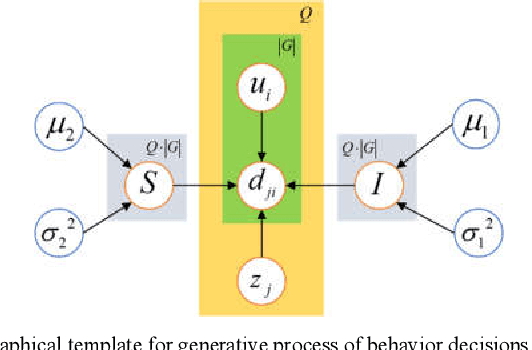
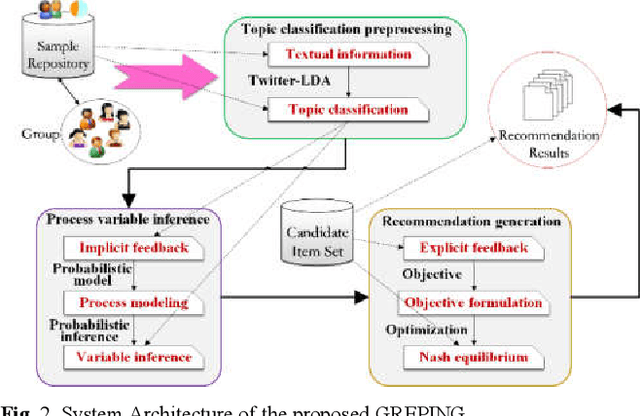
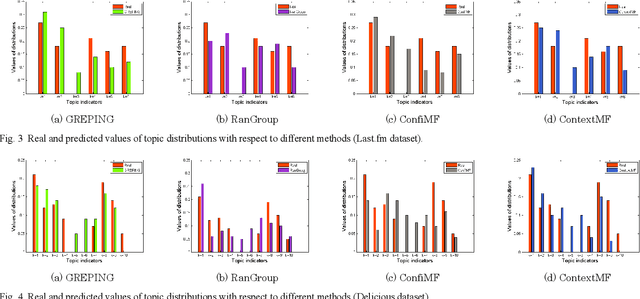
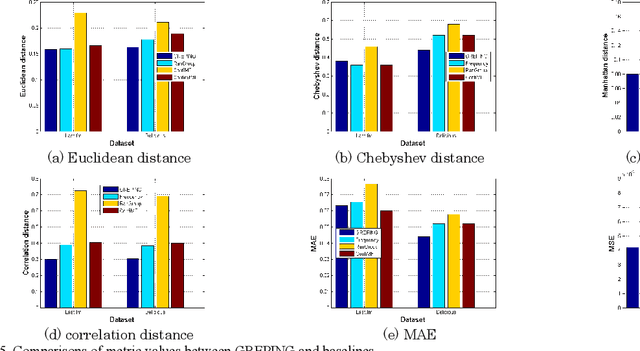
Abstract:With the prevalence of Internet of Things (IoT)-based social media applications, the distance among people has been greatly shortened. As a result, recommender systems in IoT-based social media need to be developed oriented to groups of users rather than individual users. However, existing methods were highly dependent on explicit preference feedbacks, ignoring scenarios of implicit feedback. To remedy such gap, this paper proposes an implicit feedback-based group recommender system using probabilistic inference and non-cooperative game(GREPING) for IoT-based social media. Particularly, unknown process variables can be estimated from observable implicit feedbacks via Bayesian posterior probability inference. In addition, the globally optimal recommendation results can be calculated with the aid of non-cooperative game. Two groups of experiments are conducted to assess the GREPING from two aspects: efficiency and robustness. Experimental results show obvious promotion and considerable stability of the GREPING compared to baseline methods.
 Add to Chrome
Add to Chrome Add to Firefox
Add to Firefox Add to Edge
Add to Edge